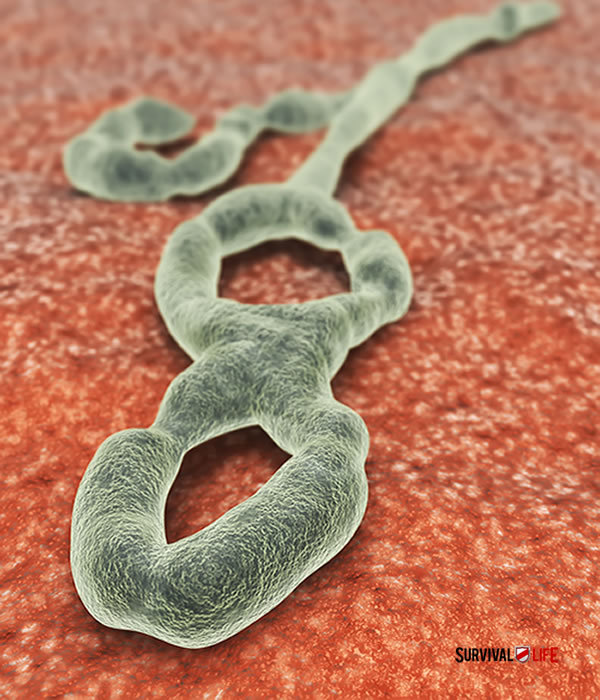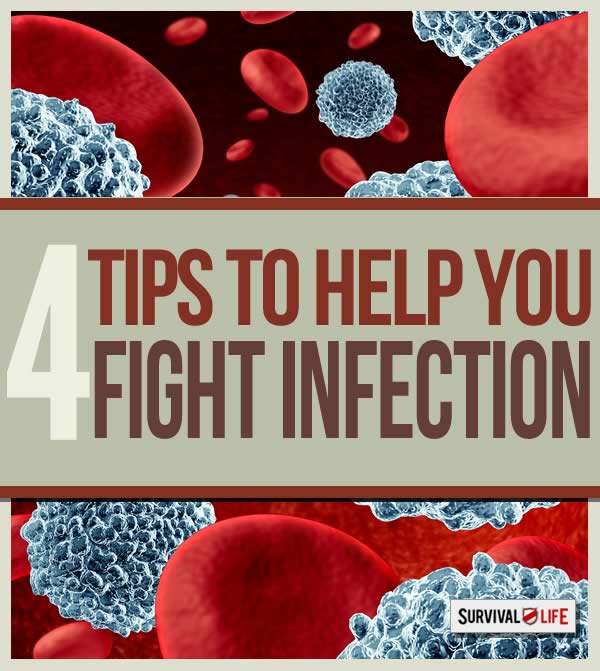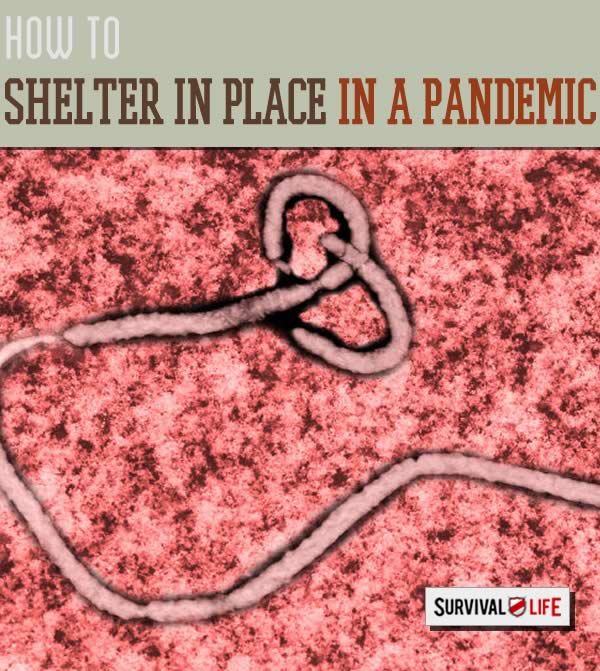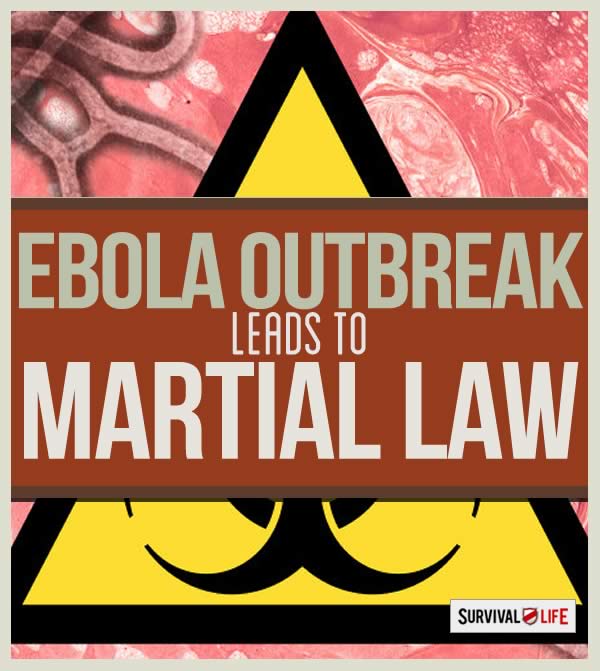Featured Articles
Seven “Need To Know” Facts About Ebola Virus

If you have been following recent headlines, you know that it has been asserted that the first case of the Ebola virus travelling aboard a commercial passenger airline has been confirmed.
According to the article, “Nigerian health authorities raced to stop the spread of Ebola on Saturday after a man sick with one of the world’s deadliest diseases brought it by plane to Lagos, Africa’s largest city with 21 million people.”
Since I am neither a health care professional nor a scientist, I cannot confirm one way or another whether the Ebola virus can be spread in this manner. What I can do, and encourage you to do, is to read up on the topic and come to your own conclusions. Furthermore, rather than go into “pandemic panic mode”, be prepared to hunker down if Ebola lands close to your homeland, wherever that may be.

Be Prepared for a Pandemic!
How to prepare for a pandemic? The usual: plenty of food, water, first aid supplies,face masks, and something to keep your mind occupied in the event you are confined to close quarters. Examples include books,playing cards, and board games. I also recommend essential oils but more about that in a moment.
You should also be prepared to physically isolate yourself. If a pandemic is even rumored, isolate yourself from large crowds, avoid commercial travel, and head out to your bug-out-location if you have one. If you work outside the home, plan to telecommute if you can and if not, take some vacation time. Above all, use common sense and keep a level head about you.
A Medical Doctor Weighs In On Ebola
You might remember Dr. James Hubbard from a recent Backdoor Survival Book Festival. He is the author of Living Ready Pocket Manual – First Aid: Fundamentals for Survival and DuctTape 911: The Many Amazing Medical Things You Can Do to Tape Yourself Together. He had this to say:
Ebola is a horrible disease but, from what I understand, it is passed only by direct contact through bodily fluids. You don’t get it by breathing the air or casual contact with someone. There have been instances in the past of air travelers having it, and no one else traveling got it. If someone with it comes to the U.S. and gets sick, chances are very good they’re going to be sick enough to go to the hospital and become isolated.
The only ones with big-risk would be the ones who had been living with, or caring for, her/him. Since it’s not airborne, it’s very unlikely a widespread epidemic would break out here in the U.S.
Or is it? Airborne, that is.
When I asked him about this, he pointed to some information posted on his website and gave me permission to share it here on Backdoor Survival. Here are his thoughts including seven facts you should know about Ebola.
Unprecedented Ebola Outbreak. Could It Spread Here?
A new outbreak of Ebola is going on in Africa, and Doctors Without Borders is calling it “an epidemic of a magnitude never seen before”—not because of the number of cases or deaths. There have been more in previous outbreaks. It’s because of how the disease is spreading.
In the past, Ebola has always stayed confined to a small region. This time the same strain of the virus has been found infecting people several hundred miles from the original area.
The questions on the minds of many people who don’t live in Africa are, could it come here? If so, how do I prevent it?
What is Ebola?
Ebola is that horrendous viral disease in Africa (so far). It’s the disease with a death rate of up to 90 percent of those infected. The one where the victims sometimes bleed out of every orifice before they die.
But other than for humanitarian reasons or if we’re going to Africa, should we be concerned?
Well, for one thing, Ebola is on the U.S. list for potential bioterror agents. That’s because it’s highly contagious and there’s no vaccine or effective treatment. Also, though this is rare, people have traveled internationally with it before their symptoms started—including to the United States.
Stopping the Spread of Ebola: 7 Facts to Know
If Ebola becomes a problem, here are some key facts you’ll need to know to reduce your chance of getting it.
1. It seems to start in animals and meat. No one’s for sure, but it’s thought the disease starts in bats. They can have the virus without getting sick. Then they infect other animals, who do usually get sick.
People kill the other animals and contract the virus while either preparing the meat or eating it poorly cooked. Then the virus starts spreading from person to person.
2. After exposure, Ebola can kick in early or late. After someone is infected, the symptoms start anywhere from two to 21 days later.
3. Ebola doesn’t spread like the flu. This is the only good thing I know about this awful disease.
Flu: You can be contagious before you get sick.
Ebola: You’re not contagious until you have symptoms.
Flu: The virus can spread through fluid droplets in the air (like from a sneeze).
Ebola: Although it’s theoretically possible for Ebola to spread this way, it doesn’t seem to.
4. Ebola is highly contagious. You can catch it by coming in direct contact with any bodily fluids, including blood, semen, urine, saliva, vomit, or feces.
5. The symptoms make prevention more difficult. Symptoms make it hard for caregivers not to come into contact with those bodily fluids.
There’s profuse vomiting and diarrhea. And the victim’s blood can’t clot. So you can’t stop bleeding from the smallest scrape, prick, or bruise. Sometimes people spontaneously bleed out the nose, mouth, rectum, or urethra.
6. Ebola is still contagious after symptoms stop or the victim dies. Ebola doesn’t stop being contagious with death or recovery. Victims’ dead bodies still carry the disease, and people who recover may continue to be contagious for up to two months or more.
7. There are ways to protect yourself. It’s essential to protect yourself at all times if you’re caring for someone who may have the disease so you don’t come into contact with the bodily fluids.
Basically, cover yourself in impermeable products from head to toe. Think goggles, mask, disposable gown, gloves, and shoe covers. If you’re using needles, use them once only and dispose of them immediately.
Also disinfect your environment. Clean any exposed furniture, walls, or floors with a disinfectant, like a chlorine bleach solution, before future use. This may not all be possible during a long-term disaster, but do the best you can.
Essential Oils for Protection from Ebola and Other Viruses
In addition to healing, I am a huge believer in using essential oils to build up immunity in order to prevent sickness. I use essential oils myself and through trial and error, learn what works and what doesn’t. I read as much as I can so that I can learn and make informed choices.
All that being said, I keep a spray bottle with Shield protective blend and witch hazel with me at all times for use as a hand and gizmo sanitizer. I spray it everywhere, including on my phone, my keyboard, on pillows and bedding, and more. If I feel a sniffle or a runny nose coming on, standalone Shield goes in the diffuser 24/7.
But what about protection from Ebola or other deadly viruses? The jury is out but as far as I am concerned, staying healthy with a strong immune system can not hurt.
One thing I did do when the recent Ebola headlines hit was do some research to find studies that specifically addressed Ebola and essential oils. I had some help but neither one of us could pull up any verified studies. On the other hand, there have been some studies and articles linking Cinnamon and Ebola. I like the cinnamon link since the Shield Blend I use contains Cinnamon Bark in addition to Clove, Lemon, Eucalyptus, and Rosemary.
I plan to keep searching for some credible information on the use of essential oils to mitigate Ebola, but in the meantime, any of the antiviral and antibacterial essential oils would be good to have on hand. Some examples are Thyme, Melaleuca, Oregano, Cinnamon and, of course, Shield.
How to Make An Essential Oil Protective Spray
Here is the recipe I use to make “Shield Protective Spray”. This spray makes a terrific hand sanitizer, room freshener, and all around disinfectant and protectant. This is so darn simple, it is embarrassing.
Take a 2 ounce glass spray bottle and add 30 drops of Spark Naturals Shield Blend.
Top with Witch Hazel
Shake before using.
That’s it. Were you expecting something more difficult?
One more note. Shield Blend is actually an ancient blend based upon a legend that has its roots in 15th century England during the time of the great plague. Grave-robber thieves developed their own blend of Clove, Cinnamon Bark, Lemon, Eucalyptus, and Rosemary to protect them while robbing the plague victims.
If you would like to try to make your own, here is a version that includes Lavender from Rebecca Schiffhauer at Camp Wander.
DIY Shield or Thieves/Robbers Blend with Lavender
Ingredients
45 drops clove essential oil
35 drops lemon essential oil
25 drops eucalyptus essential oil
20 drops cinnamon essential oil
15 drops lavender essential oil
10 drops rosemary essential oil
Instructions
Combine the all essential oils and store in a dark 15 ml glass bottle
The Final Word
I am sure you will agree that when it comes to a dread disease, Ebola is horrific. Will it become a global pandemic? Will we be exposed? That is anyone’s guess. The best we can do is to limit our exposure to others and to be prepared for physical isolation. This is one of the few instances were moving to a bug out location or to a friend or relative’s home in the boonies would be a wise idea. For any type of pandemic, voluntary isolation is a good thing.
Enjoy your next adventure through common sense and thoughtful preparation!
The Ebola Virus: Be Careful and You Will Survive!
Martial Law Declared in Response to Ebola Virus
-

 Do It Yourself7 months ago
Do It Yourself7 months agoParacord Projects | 36 Cool Paracord Ideas For Your Paracord Survival Projects
-

 Do It Yourself9 months ago
Do It Yourself9 months agoHow To Make Paracord Survival Bracelets | DIY Survival Prepping
-

 Do It Yourself9 months ago
Do It Yourself9 months ago21 Home Remedies For Toothache Pain Relief
-

 Do It Yourself9 months ago
Do It Yourself9 months agoSurvival DIY: How To Melt Aluminum Cans For Casting
-

 Exports8 months ago
Exports8 months agoAre Switchblades Legal? Knife Laws By State






Larry
August 8, 2014 at 12:00 PM
Another oil worth taking serious note is the Olive Leaf Extract. It is one of the best anti viral, anti bacteria, anti fungus known. You don’t hear much about it, but It cures so many viruses, I believe it is our best chance to help fight this virus.
I have not done extensive research on it, but have used it against flu’s, parvo, and it is amazing. What research I have done shows it fights many diseases. I would love to hear more from any professionals who study this stuff.
GD
August 8, 2014 at 5:02 PM
Do you use it as a spray mixed with something or rub it on?
O
August 8, 2014 at 12:25 PM
No disinfectant of any kind, including bleach, kills Ebola. Please do not spread this myth. I myself, an RN, am doing research now and will be contacting my niece, an infectious disease MD with the CDC to see if autoclaving kills it.
soupbone
August 8, 2014 at 4:59 PM
Good comment, O. IIRC, bleach in a 10%+ solution will kill ebola. This is about twice the concentration found in household bleach, and protective equipment must be worn when using it. I question the use of “essential oils” and other home-grown fixes; to me, these are just palliatives and can lead to a false sense of security.
The best defense against ebola, IMHO, is to recognize the signs and symptoms, and avoid contact with those showing them. Also avoiding contact with the various bodily fluids, clothing, bedding, etc., is imperative. Much of the spread in Africa seems to come from the family care and funerary practices of the people, and the sad state of the medical community.
This ebola outbreak is serious, and should be watched, but it is not something to panic over. [Remember the nationwide run on Potassium Iodide pills after Fukishima?] Awareness and knowledge of the virus are the keys to coping with the outbreak at this time. If it rears its head in this country [or Europe for that matter], more stringent steps might be necessary such as quarantining hot spots, and dealing with the political fallout after the fact.
soupbone
Don Crook
August 8, 2014 at 2:41 PM
Question for you: Does coloudal silver destroy ebola?
mwb
August 11, 2014 at 10:57 PM
10ppm Silver solution is what to take.
Laura
August 8, 2014 at 7:25 PM
The ” Shield ” Essential Oil blend that you are pushing is a copy of Young Livings “Thieves”. Gary Young did the research on the oils used by the “thieves” of plague victims. I have had fabulous success using Young Livings Thieves. I use everything from their toothpaste, hand cleaner, house cleaner, and essential oils. It is the modern original. All the Young Living Oils are therapeutic grade, meaning they can be taken internally (unless otherwise states).
Mary
August 9, 2014 at 11:36 AM
If yall haven’t heard already. Check out Dr. Rima Laibow of the Natural Solutions Foundation. She all but swears that the Nano Silver (mineral supplement solution) will cure the ebola virus. Gonna get me some. I hear the Nano Silver (smaller particles) is better than the collodial silver. I think Dr. Rima also mentioned taking hemp seed oil with the nano silver.
R Stephenson
August 12, 2014 at 10:14 AM
Why does colloidal silver work against bacteria, but NOT WORK AT ALL against viruses?
Viruses have no metabolic processes, and bacteria do. With viruses having no metabolic processes, there is absolutely nothing for colloidal silver to interfere with and kill viruses. However, everyone knows vitamin C helps with colds which are caused by viruses, and as it turns out, it is THE THING that will stop ebola in its tracks and virtually assure your survival if an outbreak happens.
I am absolutely spooked by the level of disinfo being pushed right now by scammers and probably the war department, claiming colloidal silver knocks out ebola. And it is being accompanied by scam reports saying colloidal silver works against all viruses, when in fact, it has NO EFFECT ON ANY VIRUS WHATSOEVER. The biology is completely wrong, for example, YOU can take colloidal silver safely, but it kills bacteria. That is because you do not use the same oxygen carrier that bacteria do, bacteria do not have hemoglobin. You are completely different in design from bacteria. And viruses, though microscopic, are also completely different in design from bacteria, and as a result they are not affected by the same things bacteria are affected by and are untouched by colloidal silver the same way people are not affected by colloidal silver.
paranoidpeter
August 10, 2014 at 1:11 PM
From Dr Sircus website he recommends Vit C in massive doses, Selenium and Magnesium also in massive doses
http://drsircus.com/medicine/ebola-saving-lives-natural-allopathic-medicine
http://drsircus.com/medicine/ebola-catastrophic-pandemic
Wolf Champlin
August 24, 2014 at 2:16 PM
This is great you must use a carrier oil that has been cold pressed and all the other oils must also be cold pressed.if you want to make your own from herbs make sure that you dry all these herbs in the sun for a day or two or in the oven at 180 degrees 4-5 hours or until the herbs crumbible ,after place in a dark colored mason jar or canning jar put as much in as possible than fill with your favorite cold pressed oil like olive oil etc. and store for 4-6 weeks in a dark cool place. As with any thing new spray on a localized area and wait a few hours to see the reaction from your body if nothing happens your good to good.before I go to bed I spray my children’s feet and upper thighs and in the morning I take 1-2 drops in a 8oz of water and spray some in my hair and on my skin before I leave the house you must made this part of your daily routine .if you have foot fungus add in the morning and night you will be amazed,clean your floors and so on for that added protection by doing so it scrubs the air in your house.as with any pure herb direct contact to skin will have a burning affect if apply at 100%strengh so be careful and use caution with children use small amounts and wait. There is a child section for use and children on YouTube .take care and we are all in this together……GoodLuck!
John Q Citizen
September 13, 2014 at 6:46 AM
When you start to read professionals with reputation at stake thinking and worrying out loud (http://www.nytimes.com/2014/09/12/opinion/what-were-afraid-to-say-about-ebola.html?_r=1) about an Ebola worst case scenario, it is past time to start planning for that scenario.
Airborne or not, if Ebola shows up in your community, it will probably make at least a few people nervous about travelling there. By some people, I mean people like truck drivers making $15 an hour delivering stock to supermarkets (which they do about three times a week) and people working in local hospitals or clinics. You need to plan for that!
Schools and the ability to work from the office might be effected and it might be a good idea to plan to be able to work from home (VPN) and have your kids take classes from home…at least for a while, so you might want to talk to your boss and school board and see if you can get them to plan for that!
If you belong to a church, you might want to try and get them to plan for people to take service and fellowship via conference calls and WebEx and stock the food pantry so that members can drop off anything that another member needs on their door step, ring the bell and get back in the car. You might want to try and get your church to plan for that sort of thing!
Way past the point of talking and trying to make a quick buck selling snake oil and time to start real planning!
Pingback: Seven “Need To Know” Facts About Ebola Virus | Survivalist Basics | Be Prepared For Anything!
Pingback: 4 Human Diseases Caused By Chickens | Survival Life
Pingback: 4 Human Diseases Caused By Chickens – Ultimate Survival Alerts
Pingback: 4 Human Diseases Caused By Chickens - Survival Patch